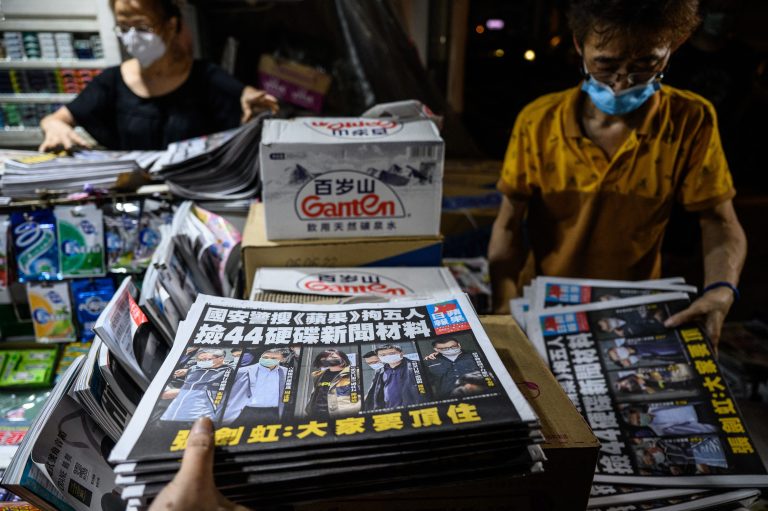Two executives of the embattled Hong Kong newspaper Apple Daily were charged on Friday, June 18, after hundreds of police officers raided their headquarters and apprehended them in what has been largely panned as a “blatant attack” on the editorial team and press freedoms in Hong Kong.
The executives, Next Digital CEO, Cheung Kim-hung and Apple Daily’s Editor-in-Chief, Ryan Law, were charged with colluding with foreign forces to endanger national security.
The two executives are anticipated to appear before the West Kowloon Magistrates’ Courts on Saturday morning.
A total of five top directors were apprehended on June 17 during the raid on suspicion of breaching the contentious national security law that was enacted in June of 2020.
Next Digital Chief Operating Officer, Royston Chow, Apple Daily Associate Publisher, Chan Pui-man and Nick Cheung, who is responsible for Apple Daily’s online news platform, have not been charged but are still being detained pending further investigation.
Success
You are now signed up for our newsletter
Success
Check your email to complete sign up
Three companies connected to the newspaper, Apple Daily Limited, Apple Daily Printing Limited and AD Internet Limited, had assets valued at HK$18 million (US$2.3 million) frozen by authorities in the wake of the raid. It is required that representatives of the companies appear before the courts on Saturday morning alongside the detained executives.
Trading of Apple Daily’s stock was halted on the markets following the raid.
This is the second raid on the papers headquarters in under a year. In August of 2020, a mere month after the national security law was enacted, police stormed the Apple Daily’s headquarters arresting the paper’s founder Jimmy Lai who is still in custody facing questionable charges related to fraud and foreign collusion.
Hong Kongers come out in support
Following the raid, Hong Kongers came out in droves to snatch up copies of the paper in solidarity with Apple Daily.
One owner of a newsstand in Mong Kok had ordered 1,800 copies of the newspaper for Friday but sold out by 2:00 am stating, “I have ordered more, I wanted 5,000 more copies,” as reported by the Hong Kong Free Press.
Despite having at least 44 computers and hard disks seized in the raid, Apple Daily heroically pressed on distributing half a million copies of their paper on Friday.
While the sprawling offices of Apple Daily, located in the Tseung Kwan O area of Hong Kong, remained mostly empty Friday two dozen editorial staff and journalists from other media outlets assisted in the printing process.
“The headline included a message from the chief executive officer of Next Digital Cheung Kim-hung, telling Apple Daily staff ‘you all have to hang in there!’” reported the Hong Kong Free Press.
In an open letter to its readers, Apple Daily stated, “this is the worst of times in Hong Kong,” and added that “Hong Kong’s press freedom is now hanging by a thread.”
“The law enforcement has labelled journalistic materials that were gathered openly as evidence of crime; while the regime has publicly called on journalists to keep a distance from fellow media workers, who are merely doing their jobs,” the open letter reads.
It continued, “History will pass judgement on today’s accusations against Apple Daily. In an era where the regime can draw arbitrary red lines, the staff of Apple Daily will remain in their positions and report the truth for Hong Kong people in a legal, reasonable and fair manner.”
National Security Unit Senior Superintendent Steve Li said the alleged offences involve 30 Chinese and English-language articles published since 2019, many having been published prior to the national security law coming into effect.














